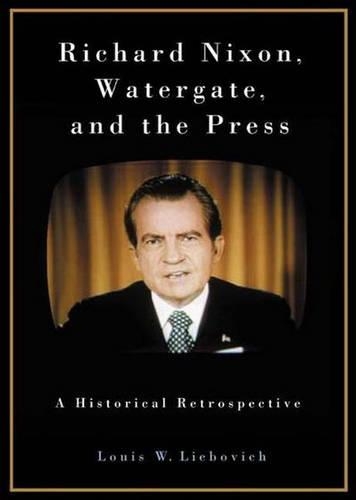
Richard Nixon, Watergate, and the Press: A Historical Retrospective
Publishing Details
Richard Nixon, Watergate, and the Press: A Historical Retrospective
By (Author) Louis W. Liebovich
Bloomsbury Publishing PLC
Praeger Publishers Inc
30th May 2003
United States
Classifications
General
Non Fiction
Biography: historical, political and military
History of the Americas
973.924
Physical Properties
160
Width 156mm, Height 235mm
397g
Description
In this re-examination of Nixon and the Watergate scandal, Liebovich draws extensively from a range of sources, including the Nixon Oval Office tapes, FBI reports and personal reminiscences of cover-up leader John Dean. Liebovich sheds new light on the Nixon administration's extensive foul play, zeal to battle and manipulate the press, scandalous miring and eventual political disgrace. After detailing the nation's news media coverage of the Watergate debacle and the ensuing breakup of American politics, Liebovich recounts the scandal's long-lasting, corrosive effect on presidential and popular politics. Scholars and students of the media and latter-20th-century American political malaise should be provoked and persuaded by Liebovich's argument that much of the public's cynicism toward the press, the president and politics stems from the bitter battles-fought in the White House, on the front pages, and on television screens - between the press and Nixon's administration. The book focuses on the fight against a press perceived as hostile to the President and charts how the nation's major newspapers and magazines covered the unfolding scandal. Various sources show how Nixon and his advisors immersed themselves so deeply in a maze of deception and mistrust that none involved could extricate themselves, creating a political tragedy that haunts us to this day.
Reviews
"Liebovich's Richard Nixon, Watergate, and the Press is more than just a reminder of the evils of Watergate. It is a well-written, well-researched, though brief, book that provides insights into how Nixon attempted to battle and to manipulate the press during the Watergate affair....[p]rovides a fascinating look at Nixons' press operations during that scandel and provides a timely reminder that Watergate was not simply the type of political shenanigans that all politicians engage in, but an astounding abuse of power that still reverberates in society today."-American Journalism
[D]oes more than merely remind us of something - the gravity of Watergate - that we may have forgotten. He also sheds a not-altogether-flattering light on the one institution whose reputation was enhanced by Watergate: the Washington press corps.-Washington Monthly
[L]iebovich shows that a credible Watergate book doesn't have to be long. Recommended for academic mass media collections and large public libraries.-Library Journal
Liebovich's Richard Nixon, Watergate, and the Press is more than just a reminder of the evils of Watergate. It is a well-written, well-researched, though brief, book that provides insights into how Nixon attempted to battle and to manipulate the press during the Watergate affair....[p]rovides a fascinating look at Nixons' press operations during that scandel and provides a timely reminder that Watergate was not simply the type of political shenanigans that all politicians engage in, but an astounding abuse of power that still reverberates in society today.-American Journalism
Louis W. Liebovich approaches Nixon and Watergate through the lens of press relations during the Nixon years. Making good use of recently released materials and tapes, Liebovich looks at the administration's press strategy almost as a metaphor for the entire presidency of Richard Nixon....Liebovich does a fine job of describing the long-term consequences of the Watergate scandal.-Presidential Studies Quarterly
Press-presidential relations are inherently adversarial. They hit bottom during the Nixon presidency. In this pithy book, Liebovich (journalism, Univ. of Illinois) argues that Richard Nixon and his inner circle had from the outset of his presidency no intention of dealing with the media in a way that encouraged mutual respect or constructive dialogue. Instead, Nixon made "war against the press," not merely holding few press conferences and hiding information, but also lying, keeping files on reporters, and in some cases playing dirty tricks on them....No reader of this book can complete it without concluding that Nixon was the author of his own miseries....Recommended. College and university libraries.-Choice
"Does more than merely remind us of something - the gravity of Watergate - that we may have forgotten. He also sheds a not-altogether-flattering light on the one institution whose reputation was enhanced by Watergate: the Washington press corps."-Washington Monthly
"Liebovich shows that a credible Watergate book doesn't have to be long. Recommended for academic mass media collections and large public libraries."-Library Journal
"[D]oes more than merely remind us of something - the gravity of Watergate - that we may have forgotten. He also sheds a not-altogether-flattering light on the one institution whose reputation was enhanced by Watergate: the Washington press corps."-Washington Monthly
"[L]iebovich shows that a credible Watergate book doesn't have to be long. Recommended for academic mass media collections and large public libraries."-Library Journal
"Louis W. Liebovich approaches Nixon and Watergate through the lens of press relations during the Nixon years. Making good use of recently released materials and tapes, Liebovich looks at the administration's press strategy almost as a metaphor for the entire presidency of Richard Nixon....Liebovich does a fine job of describing the long-term consequences of the Watergate scandal."-Presidential Studies Quarterly
"Press-presidential relations are inherently adversarial. They hit bottom during the Nixon presidency. In this pithy book, Liebovich (journalism, Univ. of Illinois) argues that Richard Nixon and his inner circle had from the outset of his presidency no intention of dealing with the media in a way that encouraged mutual respect or constructive dialogue. Instead, Nixon made "war against the press," not merely holding few press conferences and hiding information, but also lying, keeping files on reporters, and in some cases playing dirty tricks on them....No reader of this book can complete it without concluding that Nixon was the author of his own miseries....Recommended. College and university libraries."-Choice
Author Bio
Louis W. Liebovich is Professor of Journalism at the University of Illinois, Champaign-Urbana.
